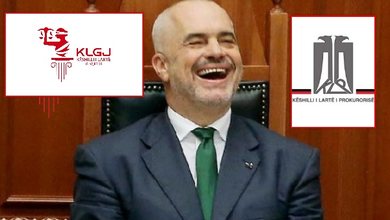
By Ersi Leka
The High Judicial Council (HJC), intended as one of the cornerstones of the Justice Reform, is today at the center of accusations of institutional capture and transformation into an instrument of political control. Documents, reports and open sources show that this institution is more closely linked to political power than to its mission to guarantee an independent and credible judiciary. Its composition, both at the decision-making and administrative levels, shows a strong presence of clientelistic appointments, supported by politics.
Analysis of the internal structure of the KLGJ reveals a bloated and politicized administration. Key positions are held by individuals with strong political connections, while the bulk of the budget goes to salaries and internal privileges, not to strengthening the infrastructure of the judiciary. This reinforces the perception that the KLGJ is not a body that guarantees justice, but an extension of executive power.
An analysis of media reports and monitoring over the past two years reveals a grim balance sheet: transparency remains an open wound for the KLGJ. Many hearings are still held behind closed doors, minutes are often delayed or kept secret, and journalists do not have full access to information. Since December 2018, a significant portion of hearings have been held without the presence of the public, a practice that violates the basic principle of accountability.
The press office of the Supreme Court of Kosovo has made efforts to build a bridge of communication with the public, but its communications often have a mechanical and robotic language, more like ready-made formulas than complete and useful information. However, compared to other institutions of the new justice system, it stands out in terms of publishing documents and announcements. Recent reports highlight that the Supreme Court of Kosovo has adopted a transparency plan and has published self-declaration forms for public officials.
But on the other hand, it is noticeable that internal rules on conflicts of interest are still lacking, creating space for politicized and unclear decision-making.
The declared mission and the reality
In official documents, the Supreme Court of Kosovo states that it aims for a high-performing and trustworthy judiciary for citizens. But the facts gathered show the opposite:
• Judicial performance is often measured according to political interests, not independent standards.
• Politicized administration uses procedures as control tools.
• Transparency is selective and partial.
• Government influence in appointments and decision-making has replaced meritocracy with clientelism.
In practice, the Supreme Court is not a guaranteeing body, but a political tool.
Prime Minister Edi Rama has intervened publicly on several occasions, criticizing court decisions and accusing the KLGJ of not performing its role properly. This type of openly articulated political pressure demonstrates not only the influence, but also the direct dependence of the institution on political power.
The Supreme Court of Justice has become an institution that serves political power more than the public. The politicized administration, lack of transparency, formal language of communication, and legal gaps in managing conflicts of interest make it closer to an instrument of political control than a guarantee of independent justice.
A new, deeper and more sincere reform is necessary to restore citizens' trust: a Supreme Court with a depoliticized administration, clear rules on conflicts of interest, real transparency, and an open and honest relationship with the media and the public.






















